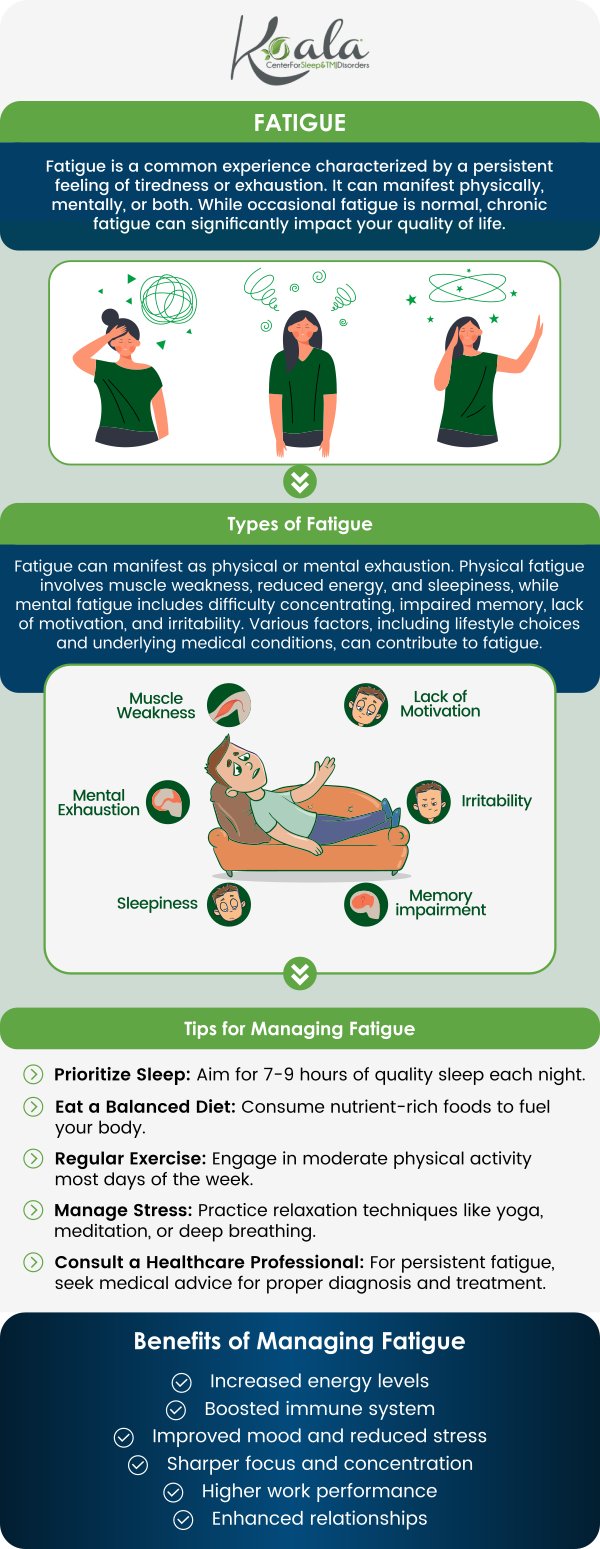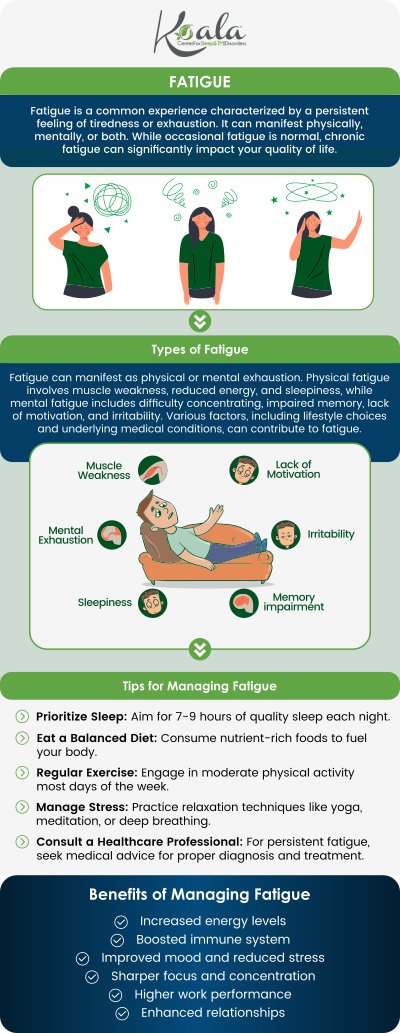Can Lack of Sleep Cause Fatigue?
Lack of sleep can lead to fatigue, reducing your energy and focus. Without proper rest, your body doesn’t recover fully, causing exhaustion and affecting your health. If you’re struggling with persistent fatigue, it may be due to sleep issues that need professional attention. It may be due to a lack of sleep. Come to Koala® Center For Sleep & TMJ Disorders and talk to our professionals for treatment. For more information, please contact us today or request an appointment online. We have convenient locations in Bloomington IL, Peoria/Dunlap IL, El Paso TX, and Wausau WI.




Table of Contents:
Can lack of sleep cause fatigue?
What are the effects of lack of sleep?
Why do I sleep for 12 hours and still feel tired?
What is the treatment for fatigue?
Is your fatigue a sign of sleep apnea? Ask our specialists at Koala® Center For Sleep & TMJ Disorders
Sleep is one of the most important and fundamental functions; without enough quality sleep each night, certain bodily processes begin to shut down. Because sleep is our primary method of restoration and rejuvenation, a lack of it can lead to lethargy and tiredness. Sleep deprivation, which is the term used to describe repeat occurrences of lack of sleep, can lead to a reduction in mental alertness, a decline in concentration levels, and an increase in irritability.
The short answer is yes, lack of sleep can cause fatigue. The long answer is that it depends on the person and their lifestyle. Fatigue is a feeling of tiredness or weariness that can be caused by a number of factors including lack of sleep. Lack of sleep can cause fatigue because it deprives the body from its restorative processes that can only take place during deep sleep.
Lack of sleep can affect the body and mind in many ways; its effects are categorized into two main groups: short-term and long-term.
Short-Term Effects — Even in the short term, lack of sleep symptoms can affect and disrupt the ability to perform day-to-day activities. Not getting enough sleep can have an almost immediate effect on a person’s mood, energy levels, and ability to focus, as well as an increase in stress levels. Lack of sleep can disrupt stress hormones, affecting cognitive abilities and emotional regulation. As the sleep deficit builds up, problems with motor function can eventually develop from excessive daytime tiredness. If operating a vehicle or other machinery, this lack of coordination and slow response time can become dangerous.
Long-Term Effects — Long periods of sleep deprivation can have even more serious effects on an individual’s physical, mental and emotional health. Chronic difficulty sleeping is often a sign of a sleep disorder, such as insomnia; this often requires medical attention. Sleep deprivation can affect the body in many ways; over time, getting poor sleep or not enough sleep can compromise immune system health, increasing a person’s susceptibility to common illnesses. Sustained lack of sleep has also been linked to obesity; not getting enough sleep disrupts the balance of hunger-regulating hormones, ghrelin and leptin. Additionally, as sleep is the time the body uses to rebuild and repair itself, not getting enough sleep can disrupt this process. Sleep is also fundamental in how the brain processes information and stores memories; therefore, poor sleep can cause problems with learning.
It is entirely possible to get more than enough sleep and still feel tired. In fact, most of us are familiar with this phenomenon, and often hear the term “oversleep” as a result. Sleeping for too long can interfere with the body’s internal clock, or circadian rhythm; consequently, it can be harder to fully wake up, which can negatively impact productivity.
The recommended treatment for fatigue will depend on what is causing it, as well as the symptoms the patient is experiencing. To make a diagnosis, the sleep specialist will likely ask questions about:
– The nature of fatigue, including when it started, how often it occurs, its severity, its effects on other areas of life, and if it gets better or worse at certain times
– Other symptoms that occur alongside fatigue
– Other medical conditions that are present
– Lifestyle factors and sources of stress
– Current medications, including over-the-counter medicines
If the doctor suspects that an underlying medical condition is a culprit, they may order some medical tests, including blood or urine tests.
If you are struggling to overcome your fatigue, come to Koala® Center For Sleep & TMJ Disorders, where our sleep specialists can develop a customized treatment plan to address your needs.
Chronic fatigue can be a frustrating and debilitating condition, but it may be a sign of an underlying sleep disorder like sleep apnea. At Koala® Center For Sleep & TMJ Disorders, our team of specialists is dedicated to providing an accurate diagnosis to uncover the true cause of your exhaustion. We understand that a lack of restful sleep can significantly impact your energy levels, but with a personalized treatment plan, which may include a custom oral appliance, we can help you get the deep, restorative sleep your body needs. Don’t let fatigue control your life; let us help you find the lasting energy and relief you’ve been looking for. Call us today to book an appointment with our fatigue treatment specialist, or visit one of our locations.

Additional Services You May Need
▸ KoalaKIDZzz®
▸ Sleep Apnea
▸ Snoring
▸ TMJ Disorder
▸ Fatigue
▸ Sleep Disorders
▸ Weight Loss
▸ CPAP Alternative
▸ Oral Appliances




